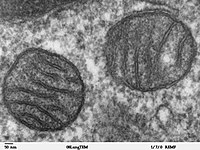
Photo from wikipedia
Mitochondrial diabetes (MD) is a heterogeneous disorder characterized by a chronic hyperglycemia and is maternally transmitted. Syndromic MD is a subgroup of MD including diabetic microangiopathy and macroangiopathy, in addition… Click to show full abstract
Mitochondrial diabetes (MD) is a heterogeneous disorder characterized by a chronic hyperglycemia and is maternally transmitted. Syndromic MD is a subgroup of MD including diabetic microangiopathy and macroangiopathy, in addition to extrapancreatic disorder. MD is caused by genetic mutations and deletions affecting mitochondrial DNA. This mitochondrial damage initiates apoptosis. In this study, we hypothesized that functional polymorphisms in genes involved in apoptotic pathway could be associated with the development of apoptosis in MD disease and increased its risk. Detection of apoptosis was confirmed on muscle biopsies taken from MD patients using the TUNEL method and the Cytochrome c protein expression level. We genotyped then 11 published SNPs from intrinsic and extrinsic apoptotic pathway and assessed the signification of these polymorphisms in 43 MD patients and 100 healthy controls. We found 10 selected polymorphisms (p53 (rs1042522 and rs17878362), BCL2 (rs2279115), BAX (rs1805419), BAK1 (rs210132 and rs2227925), CASP3 (rs1405937), CASP7 (rs2227310), CASP8 (rs1045485) and CASP10 (rs13006529)) with a potential apoptosis effect in MD patients compared to control population. Specifically, SNPs involved in the intrinsic pathway (p53, BCL2, BAK1 and CASP3) presented the highest risk of apoptosis. Our result proved that apoptosis initiated by mtDNA mutations, can be emphasized by a functional apoptotic polymorphisms associated with high expression of cytochrome c protein and more myofibers with apoptosis in syndromic MD subgroup compared with non-syndromic MD subgroup.
Journal Title: Gene
Year Published: 2018
Link to full text (if available)
Share on Social Media: Sign Up to like & get
recommendations!